Publish your Research
Share research, Engage with Policy Makers and Impact Society
In the Media
Canon Collins Trust presence in the media
As well as the presence of Canon Collins scholars and alumni in southern African media

Share research, Engage with Policy Makers and Impact Society
The Conversation has 1.6 million readers a month. If you’ve been wondering how to get your research into the public domain so people can understand how it affects them, consider publishing with The Conversation.
The Conversation’s editors will work collaboratively with you. You approve their edits, and nothing is published without your approval. Their creative commons model means that any article published on their site can be republished anywhere in the world as long as they don’t change the copy and they credit you as the academic. In this way, when you publish on The Conversation Africa site, your writing is shared far and wide.
To be published by The Conversation you must be currently employed as a researcher or academic with a university or research institution. PhD candidates under supervision by an academic can write for the Conversation as long as they have completed their fieldwork. Currently The Conversation does not publish articles from Masters students.
Contact Catherine if you qualify to publish and would like support in approaching The Conversation: catherine@canoncollins.org
Alternatively, go directly to The Conversation: https://theconversation.com/africa/pitches
All the pitches that are sent in on this link are looked at by a group of editors every Tuesday and Thursday afternoon.
Send a 100-word (at most) outline of a proposed article, a 10-line (or shorter) summary of your experience and an example of your previous work (preferably, an internet link to the publication in which it appears).
Write “Feature Submission” in the subject line to editoronline@mg.co.za
Send an opinion piece to opinion@mg.co.za with “opinion piece” in the subject line.
Please always include a short biography with the article together with a photo.
Contact Catherine if you would like support in approaching Mail and Guardian: catherine@canoncollins.org
Below are a few guidelines for contributors:
1. The article must be exclusive to the Mail & Guardian.
2. Have hyperlinks — not footnotes — to relevant articles/research. (This allows readers to click on the links if they want to learn more about a particular aspect of the piece.)
3. Be between 800 and 1500 words.
4. Include a photo of the author/s.
5. Include a bio of about 30 words or less.
6. Include any social media handles (not mandatory)
7. Send the piece as an attachment (Word or Google Doc, preferably not a PDF).
It can take a few days for pieces to be read and considered. Mail and Guardian receive dozens of submissions daily and need to give each one the same attention, so please be patient. If the article is time sensitive (related to an upcoming event/special day etc), please indicate that in the subject field. If they decide to publish the piece, they will inform you.
Daily Maverick editorial policy for submissions
NB: Submissions which promote products and/or for-profit companies will not be considered for publication unless there are exceptional and compelling circumstances.
Note that our preferred length for Opeds/Opinionistas is between 700 and 1,400 words. In exceptional circumstances, we will consider longer submissions.
Submissions must be in Word Document or plain text format, and not PDFs. Photographs must be high-resolution jpegs.
Submit accurate personal details as to your identity (a short biography), contact details, as well as a high-resolution head and shoulders photograph of yourself (the writer).
Note that we use standard British English spellings and grammar, and NOT American English.
Wherever relevant (and feasible) include hyperlinks to supporting/background texts, references, organisations, court judgments etc. If you are not sure how to insert a hyperlink, paste the URL in brackets at the end of the relevant paragraph and we will insert the link.
Disclose any financial or personal relationships with entities cited in the article, or other conflicts of interests.
Disclose whether the piece in question has been published before, and where – note that as a rule, we do not publish opeds/opinionistas that have already been published in other media.
Disclose whether any artificial intelligence/large language model programs have been used in the writing of the article. Indicate exactly which sections of the article have been written using AI assists.
Acknowledge use of the work of others by:
(a) identifying the original source of an idea;
(b) using quotation marks where words have been directly lifted from another source;
(c) identifying the original author immediately before or after the quoted words; and
(d) including hyperlinks to original articles quoted from in addition to using quotation marks and identifying the author.
Always include the first names of all persons cited or quoted in the article at first mention – this includes the first names of judges, academics, lawyers, etc.
Note that submissions which have as the subject any dispute, consumer complaint, legal action, disciplinary action etc in which the writer is the complainant/subject will not be considered for publication unless there are exceptional and compelling circumstances.
Abide by editors’ final decisions on headlines and editing.
Contact Catherine if you wish to publish: catherine@canoncollins.org
Life is political – and personal experience is sometimes the best way to influence political change. If you want to tell your story rather than share research or only share research, contact Catherine. Catherine will help you to develop the story and find the best place to publish: catherine@canoncollins.org
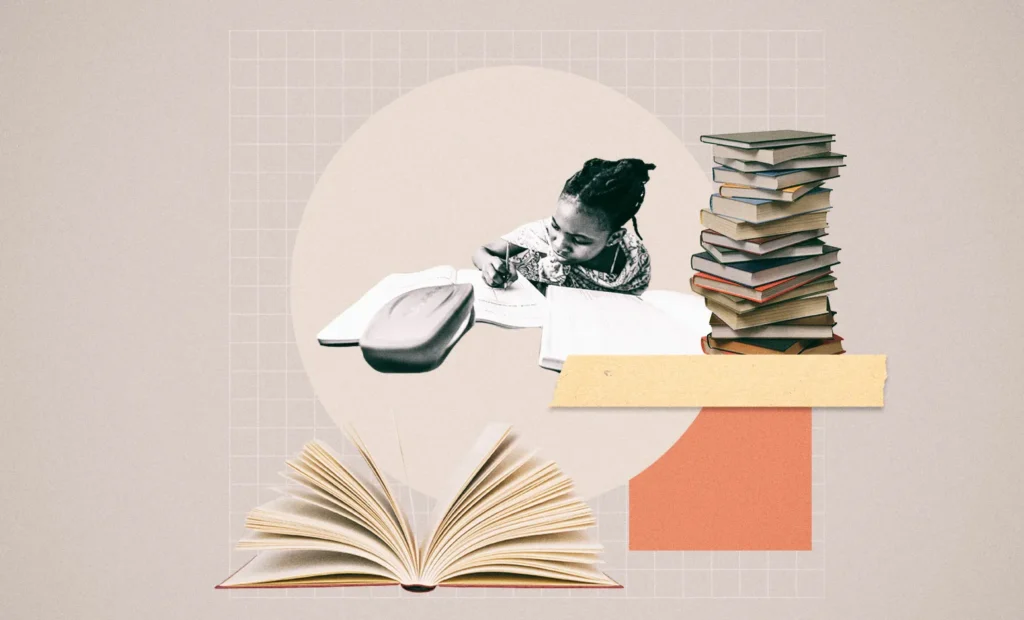
In this article, Yolisa Piliso, a Canon Collins alum, together with Emihle Tima and Makanatsa Ziyambi, examines the reality of violence in South African schools. The recent Milnerton High incident showed how serious and entrenched the problem has become. The authors explore the drivers of the crisis, why policing and criminalisation are not effective solutions, and how the Department of Basic Education continues to overlook the root causes.They make the case for a different approach. Learners need meaningful psychosocial support, proper protection, trained school safety structures, and disciplinary processes that hold them accountable without pushing them into the criminal justice system. Schools should be places of learning, not entry points into the school to prison pipeline.
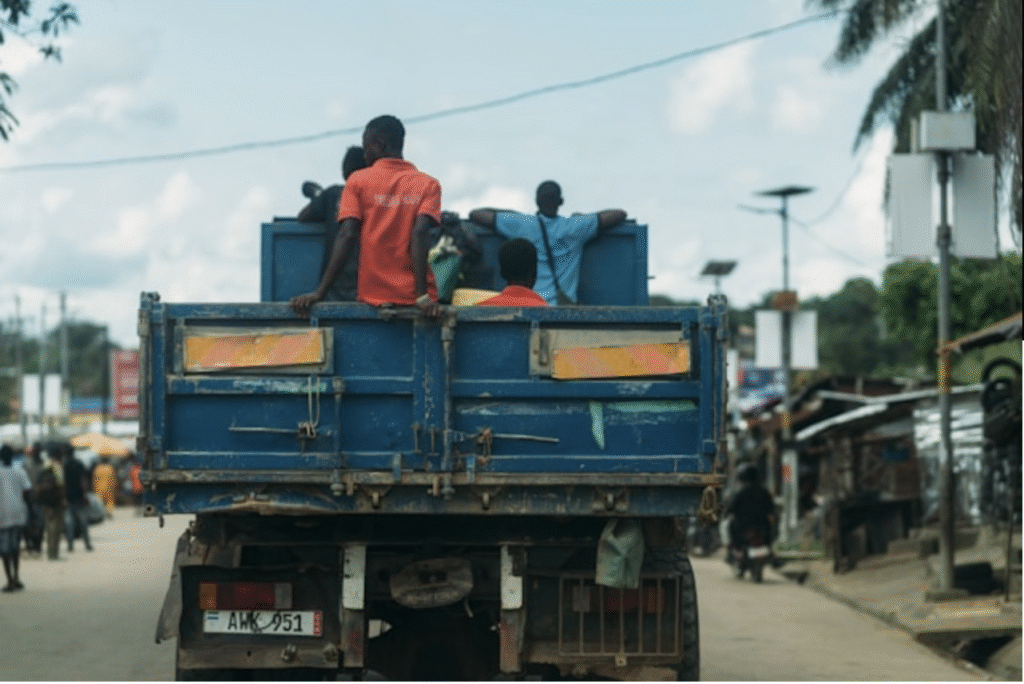
Canon Collins Trust Scholar and PhD candidate Gerald Mandisodza reminds us that behind every statistic is a story. Young women promised jobs that turn into forced labour. Children forced into domestic servitude or mine work. Mothers deceived into exploitation disguised as opportunity. These stories reveal a cycle of poverty, gender inequality, and weak governance that traffickers exploit with brutal efficiency.
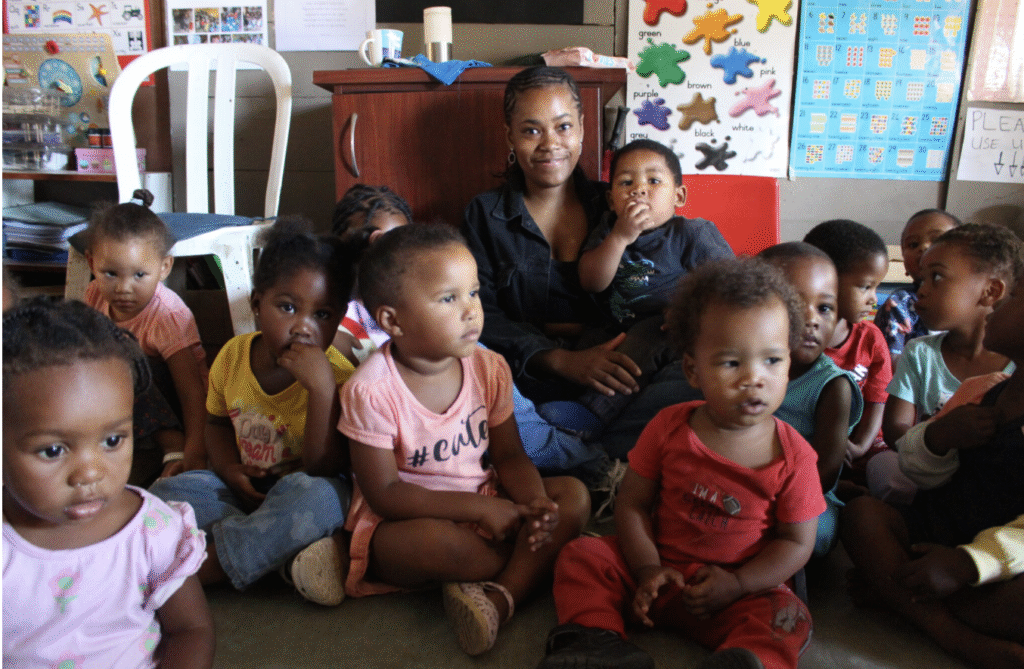
In her award-winning essay, Canon Collins Trust Alumna Kimberly Zvikomborero Mabaso reflects on life in the in-between - between ability and disability, between citizenship and exile, between being seen and being understood. Born in Zimbabwe and raised in South Africa, she writes with quiet precision about how identity can become a border, and how exclusion often hides in forms, checkboxes, and polite silences.
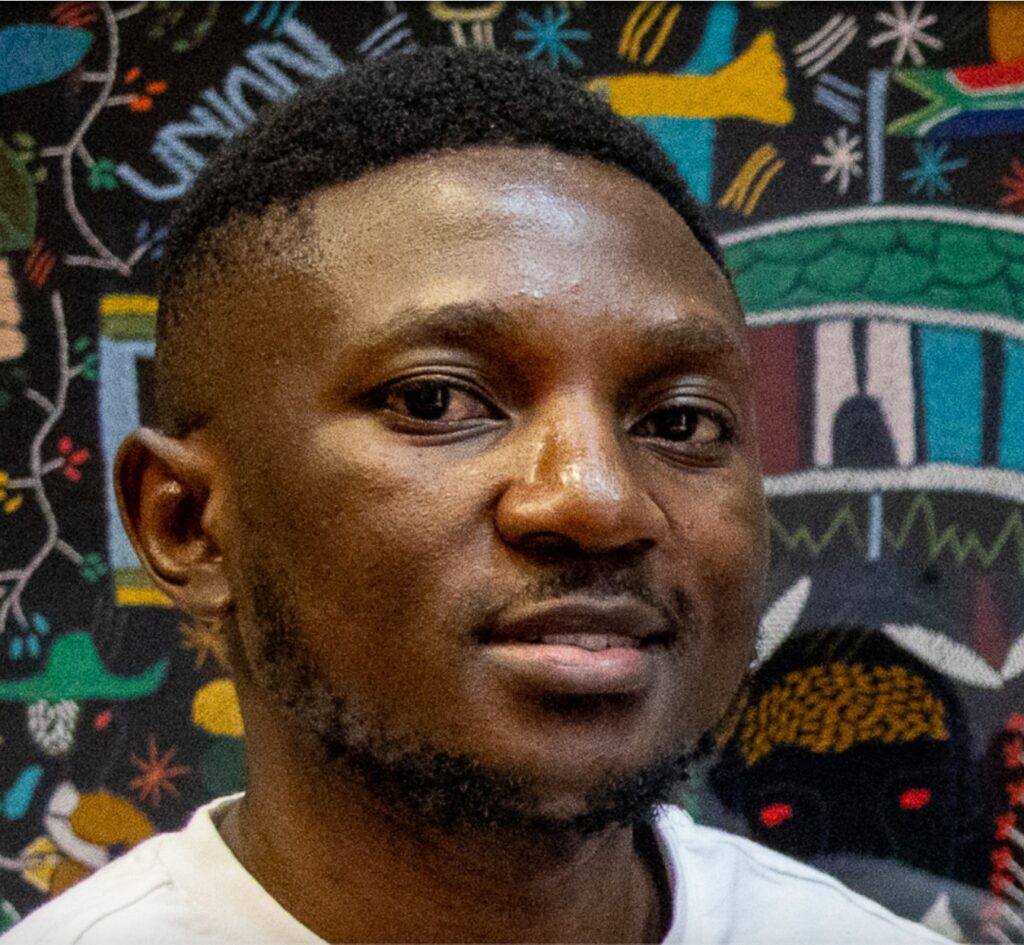
In his award-winning essay, Canon Collins Trust Scholar Gerson Ingashipola Shikukumwa confronts the uncomfortable truth that the post-colonial moment did not end conquest; it merely rebranded it. Through sharp analysis and fearless critique, Gerson exposes how constitutional silence, political politeness, and the myth of neutrality have preserved colonial property regimes in both South Africa and Namibia. His essay argues that reconciliation without redistribution was never justice, only deferral, and that the language of neutrality has become a tool to protect privilege.

Canon Collins Trust alum Abongile Nkamisa, lawyer at Open Secrets, digs into Eskom’s secret pricing deal with aluminium giant South32 and what it reveals about how “commercial confidentiality” is being used to block public access to information. When billions in public funds are at stake, secrecy isn’t just bad governance, it’s costly.
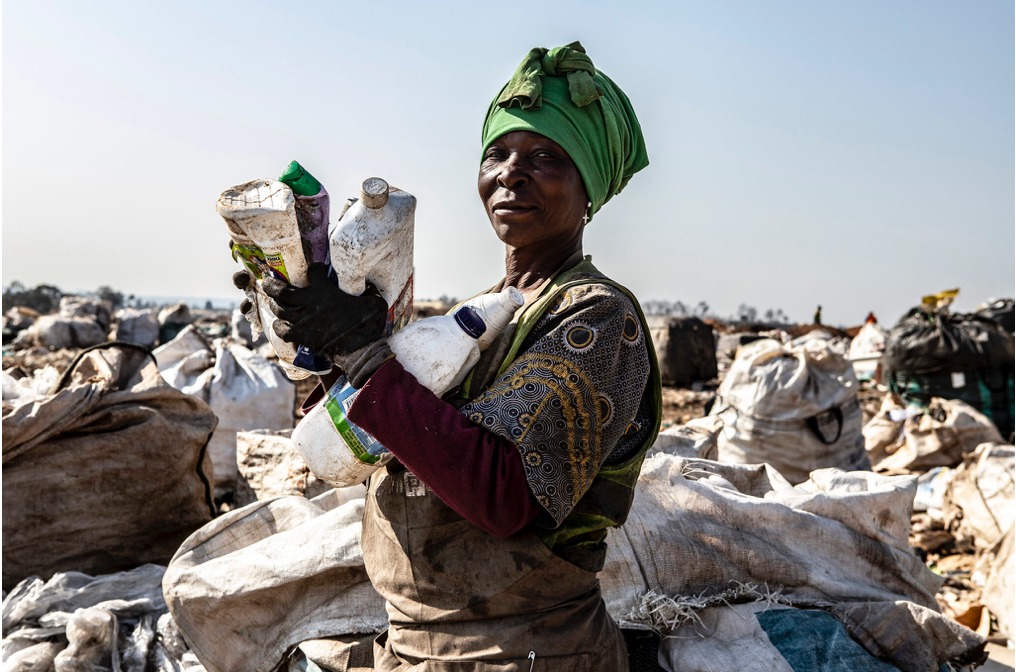
Johannesburg’s landfill crisis is not just about waste management — it’s about people’s livelihoods. At the Marie Louise site alone, close to 300 reclaimers survive by salvaging recyclables. Sudden closure notices, reversals, and a lack of transparency from the city and Pikitup have left reclaimers uncertain about their futures.
As alum Aarti Bhana reports, reclaimers and the African Reclaimers Organisation (ARO) are demanding a just transition: one that centres their rights, protects their income, and acknowledges the essential role they play in keeping Johannesburg’s recycling system alive.
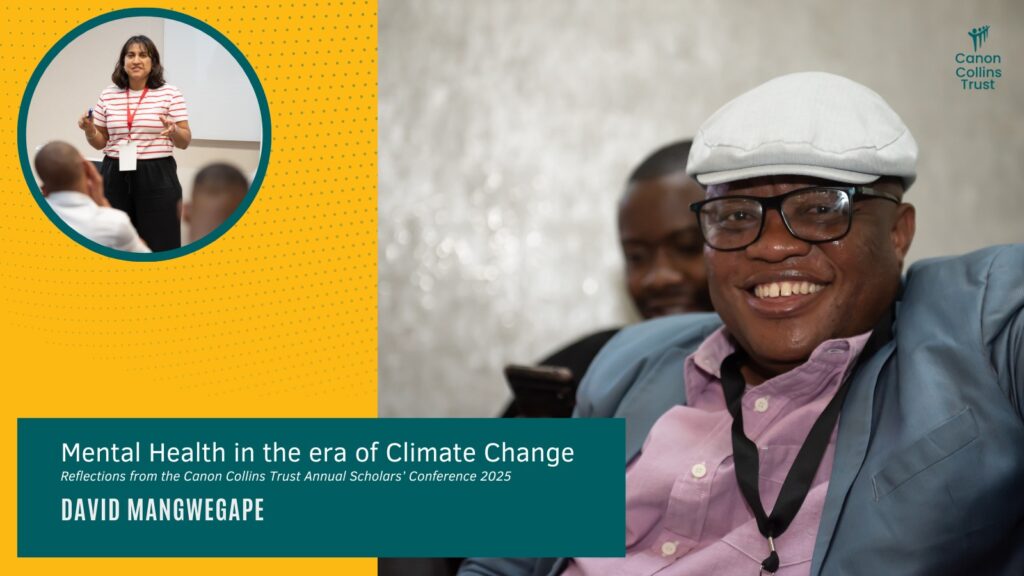
Canon Collins Trust Scholar, David Mangwegape, reflects on the Canon Collins Trust Annual Scholars' Conference, held from 29–31 August 2025 in Sandton, South Africa. One session in particular stood out: "Climate Justice in an Age of Crisis: Building Caring, Intersectional Communities for a Just Future," facilitated by Ilham Rawoot.
The discussion highlighted a critical but often overlooked dimension of the climate crisis: its impact on mental health. From eco-anxiety and solastalgia to the trauma caused by floods, wildfires and other extreme events, the evidence is clear. Climate change compounds social, economic and environmental risks, leaving already vulnerable communities even more exposed.
The call from participants was strong. Climate policies must integrate mental health. Practitioners need the tools to address this intersection. And research must continue to guide both policy and practice.
This conversation reinforced an urgent truth. Climate justice is inseparable from mental health justice.

A powerful and timely analysis by Janet Solomon, a Canon Collins PhD Scholar and CCT Scholar
In her latest piece, Janet examines South Africa’s offshore oil and gas agenda under Operation Phakisa. This policy framework stands in direct contradiction to the urgent climate and oceanic changes shaping our future. She unpacks the flawed economic assumptions behind this initiative, exposing how weak commercial viability, outdated infrastructure, and high environmental costs undermine claims of “sustainable development.”
Drawing on expert reviews, public investigations, and current market realities, the article presents a compelling case for shifting away from fossil fuel dependency toward a transparent, accountable, and climate-resilient energy future.
Janet Solomon is a filmmaker, artist, and co-founder of the Oceans Not Oil coalition. She continues to use research and creative storytelling to challenge extractive narratives and advocate for ecological integrity in South Africa’s energy transition

What happens when a university assignment reveals a gap in the curriculum and a systemic failure of representation?
In this powerful feature, Canon Collins alum Msakha Mona reflects on a moment that shifted the course of his life: being asked to write about a playwright who inspired him, only to be given a list with no African names. That moment led to a career committed to decolonial thinking, language justice, and community-driven education.
Now based at UCT’s Centre for Higher Education Development, Mona founded the Kulani Arts Project. This bold initiative uses storytelling, performance, and multilingual engagement to bridge African knowledge systems and the university. It centres youth often excluded from formal education, challenges what counts as academic excellence, and asks hard questions about who higher education truly serves

This piece by Canon Collins Trust Scholar and Master of Laws candidate, Abongile Nkamisa and Bwanika Lwanga pulls no punches. South Africa's legal system is at a crossroads. Corporate law firms are challenging the Legal Sector Code, using procedural arguments to stall transformation. But this is not just a technical debate. It is a clear effort to protect privilege and maintain a status quo that excludes most South Africans.
The authors draw a direct line from apartheid-era legal strategies to today's resistance against change. Three decades after democracy, the legal profession still mirrors old hierarchies. Diversity policies exist, but real power remains in the hands of a few. Transformation is treated like a public relations exercise rather than a constitutional imperative.
This article is not subtle, and it should not be. It asks the legal profession to make a choice. Will the law be used to open the doors of justice or to keep them closed? If the Constitution is a tool for social justice, then it cannot coexist with legal strategies that entrench inequality.
The message is simple. If the law is not actively advancing justice, it is reinforcing power. That is not neutrality. That is complicity

Our alum, Aarti Bhana, recently travelled to and wrote an insightful reflection on how global experiences can reshape how we think, work, and connect. The piece offers more than a snapshot of life in a fast-moving country. It highlights the quiet, everyday moments that reveal how deeply the future is embedded in the present.
From navigating cities with seamless digital payments to stepping into driverless cars, the experience is a reminder that innovation is not just about technology. It is about how people live, move, and adapt. And when we travel with curiosity and openness, we do more than observe. We learn. We connect. We start to see how different ways can inform our approaches to home challenges.
Travel is not a luxury. It is a form of education. And when those experiences are shared through storytelling, they multiply in value. Stories from the ground help break down stereotypes, challenge assumptions, and show what is possible. They also remind us of our shared humanity.

Gerson Shikukumwa speaks from a place of principle and empathy, urging us not to look away from the human cost of the Israel-Iran conflict. He reminds us that when civilian spaces are turned into battlegrounds and diplomatic norms are disregarded, it's not just politics at stake but people's lives, safety, and dignity.
Gerson is a Canon Collins Scholar and a master's student in Political Science at the University of the Free State. He writes as a political scientist. His offer here is not a political line but a call for moral consistency, for protecting human rights no matter who is involved.
In a world that too often chooses sides instead of choosing humanity, voices like this matter.
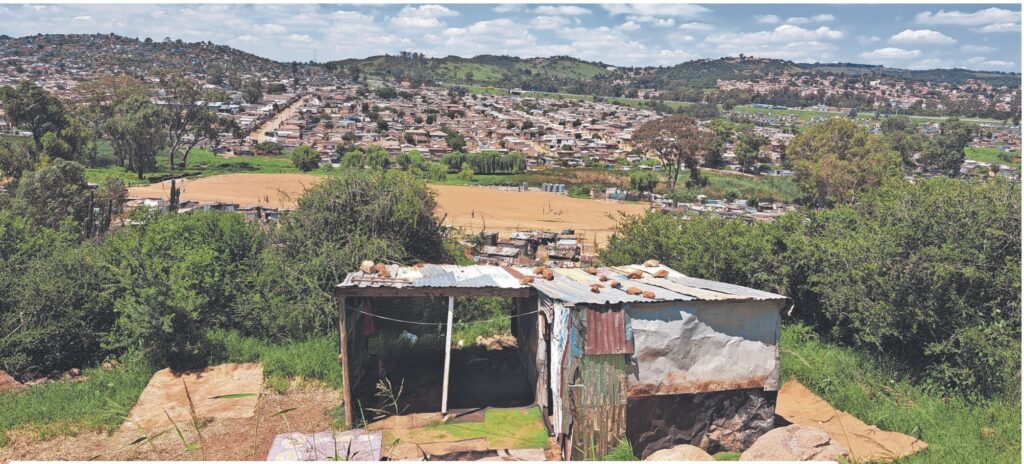
Corruption in plain sight: A powerful new investigation in the Mail & Guardian reveals how officials in Johannesburg are linked to the hijacking of RDP houses in Freedom Park.
The article was written by Canon Collins Trust Alum and the 2024 Sylvester Stein Fellowship winner, Aarti Bhana. The fellowship, created in memory of Sylvester Stein, supports journalism in southern Africa with a strong focus on human rights and social justice. This is precisely the kind of work it was meant to support.

On 21 May, Finance Minister Enoch Godongwana tabled Budget 3.0
In this NewzRoom Afrika interview ahead of the budget speech, Canon Collins alum and Section27 Budget Analyst Matshidiso Lencoasa shares key insights into what was missing and why real investment in public health and education, especially the absorption of trained doctors and teachers, cannot be delayed.
A strategic budget must go beyond numbers. It must serve people.

What happens when we apply rhyme analysis to English translations of a Latin epic? Canon Collins Trust Scholar Bronwyn Bowles King's new article offers a fresh and compelling perspective on Virgil's Æneid, revealing how rhyme, often considered secondary in classical translation, can reshape our experience of the text.
In Part 1 of this series, she explores how rhyme clusters, slant rhymes, and sonic echoes heighten or disrupt meaning unexpectedly. This is not just literary analysis; it's a deep engagement with how language and sound travel across time and translation.
Highly recommended for anyone interested in literature, classical studies, poetry, or translation theory.
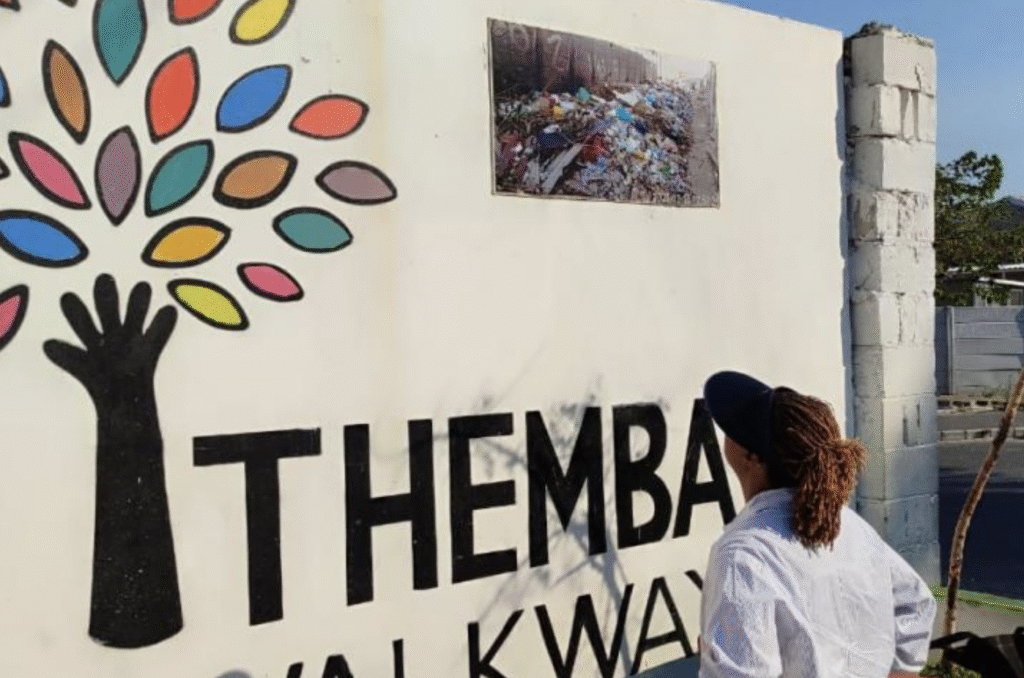
What do you do when your usual research tools stop working? Canon Collins Scholar Faith Gara found herself facing this question during fieldwork in Cape Town's Cape Flats. With no car, limited access to digital tools, and long commutes through under-resourced areas, she discovered something powerful. By slowing down, being present, and listening closely to people in everyday settings, she uncovered a different kind of knowledge. One shaped by struggle, transformation, and everyday acts of resistance. Her journey is a reminder that even in uncertainty, there is purpose and meaning.

Charlotte Scott, a Canon Collins Scholar and PhD candidate in Climate Change at the University of Cape Town, makes a compelling case for framing genocide as both a human rights and a climate justice issue. Using the current situation in Gaza as a focal point, she explains how acts of mass violence often target critical civilian infrastructure like water systems, agriculture, and healthcare. These attacks cause immediate human suffering and deepen long-term environmental harm and social vulnerability. Scott argues that climate justice cannot be separated from political context. When entire populations are made deliberately more exposed to climate risks through war and occupation, environmental collapse becomes part of the weaponry. The piece is a call to recognise that justice for people and justice for the planet are inseparable.
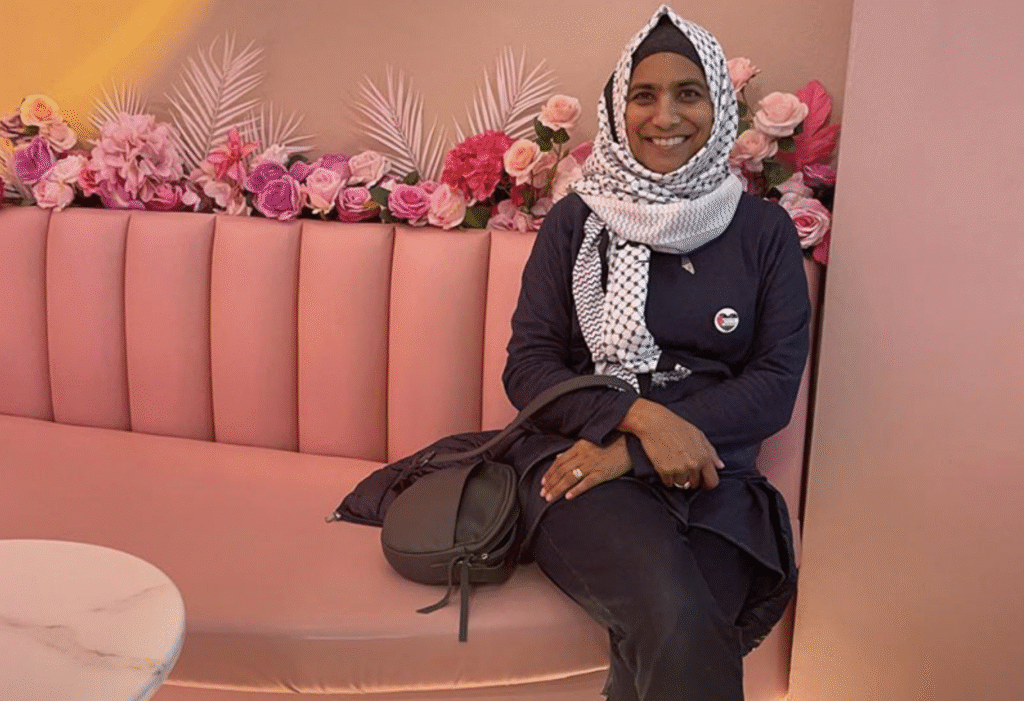
A recent study by Canon Collins Trust Scholar and UCT PhD candidate Fadia Gamieldien highlights a critical gap in South Africa's mental healthcare system. While clinical treatment is essential, many individuals with severe mental health conditions find themselves without adequate psychosocial support upon discharge from psychiatric facilities. This lack of community-based services hinders their personal recovery and reintegration into society.
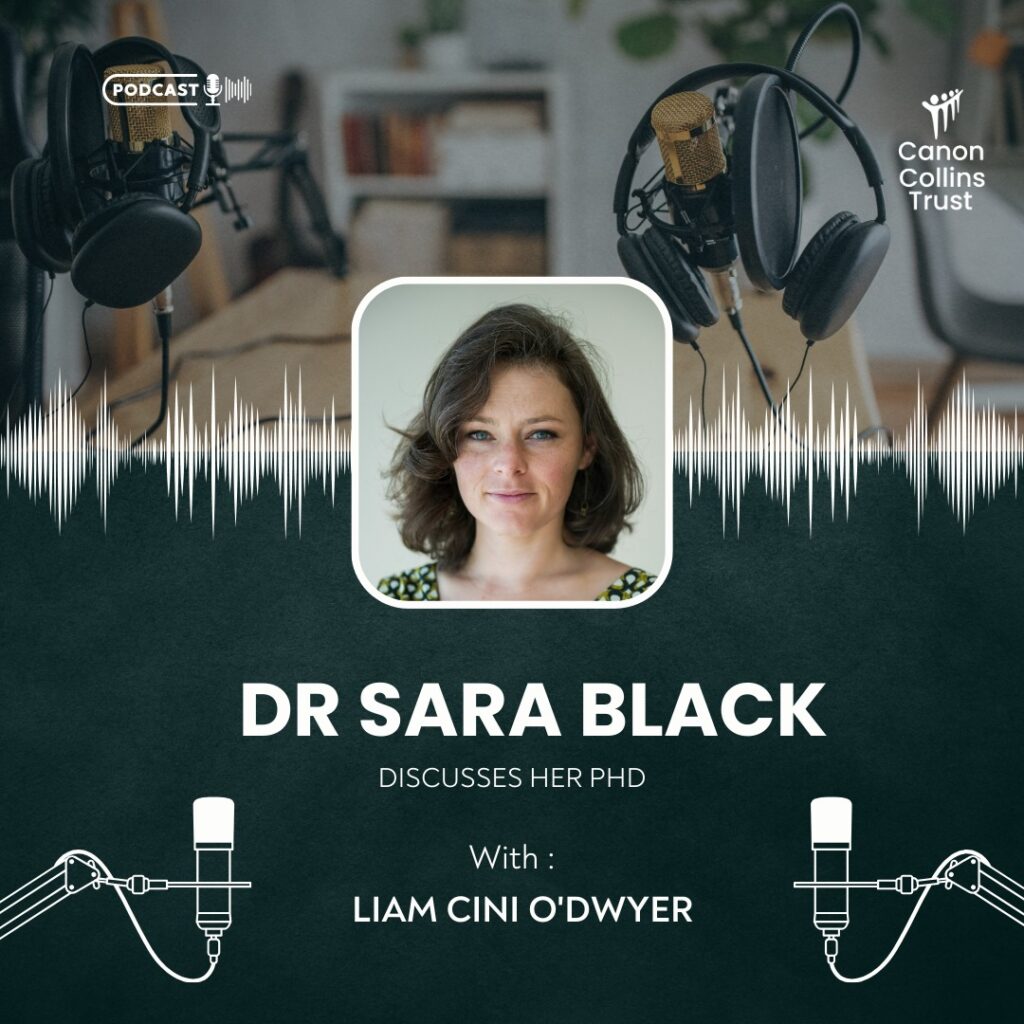
How does education shape (and reflect) social justice? In this episode of It's Just Research: Critically Questioning the World We Live In, hosts Liam Cini O'Dwyer and Canon Collins Alum Dr. Sara Black dive into her PhD research on critical geography and the sociology of trust.
Dr. Black unpacks how schools mirror our relationship with the state, exposing deep-seated patterns of mistrust in public institutions. She explores who truly benefits from education—and who is left behind—through the lens of wealth, class, and access. Plus, a powerful insight: poverty is not just about money but time. How far ahead can you plan your future? How does that impact everything from school applications to daily life?
Tune in now for a thought-provoking discussion that challenges how we see education, justice, and opportunity

When Those Who Should Defend the Constitution Become Its Greatest Threat
Progressive constitutions are the backbone of democracy—sacred frameworks meant to be upheld, not broken. But what happens when those entrusted to protect them are the first to violate them? In a compelling analysis, constitutional lawyer and Canon Collins Trust Alum, Dr Justice Alfred Mavedzenge warns that postponing Zimbabwe's 2028 general election to extend President Mnangagwa's term could ignite a constitutional crisis and trigger the collapse of government. Such a move, he argues, would be a direct violation of the constitution, plunging Zimbabwe and the broader SADC region into political turmoil with devastating consequences. As the nation stands at a critical crossroads, Mavedzenge's insights highlight the urgent need to uphold constitutional mandates for the sake of stability and democracy.

How do we balance competition and cooperation in a world where global powers contend, and environmental priorities demand urgent attention? Canon Collins Scholar and PhD Candidate Kudakwashe Manjonjo, co-author of "Great Power Competition and Green Protectionism," explores the intricate tensions between economic rivalry and pursuing a sustainable future.From carbon tariffs to clean energy innovation, this insightful article examines how geopolitics influences the green transition and its implications for our planet and policymakers.

Namibia’s electoral democracy is under the microscope! Dive into this revealing analysis by Canon Collins alum Dr Justice Alfred Mavedzenge as the Supreme Court tackles the heated 2024 Presidential Election Petition. Allegations of rigging, a disputed voting extension, and questions about fair play are sparking a debate that could redefine Namibia’s future.

A country's budget is more than a tally of numbers; it's a revealing glimpse into the nation's future. In this incisive CityPress piece, coauthored by Canon Collins Alum Matshidiso Lencoasa, bold economic promises, government spending, and hidden pitfalls are laid bare. The article also highlights the urgent need to invest in education, especially for young girls. It challenges us to ask: Are we truly building a foundation for lasting change?
Read more here

Namibia’s high voter turnout highlighted its vibrant democratic spirit, but logistical hiccups—like ballot shortages and tech glitches—cast a shadow.
In this thought-provoking article, Canon Collins Scholar and political scientist Gerson Shikukumwa challenges us by asking a critical question: Can Namibia address these flaws and build a resilient, independent electoral system?

South African universities have the potential to drive profound societal transformation. By addressing critical challenges like poverty, climate change, and unemployment, they can move beyond academics to shape critical thinkers and impactful changemakers. In this compelling piece in the Mail & Guardian, Canon Collins Trust Executive Director Ivor Baatjes argues that it’s time to reimagine higher education—championing equitable access, safeguarding academic freedom, and fostering a culture of active, engaged citizenship. Let’s build institutions that not only educate but also uplift and serve the public good.

How can we ensure LGBTQIA+ individuals receive compassionate, evidence-informed care? Canon Collins Trust Alum Dr. Marion Stevens, alongside co-authors, delves into the urgent need for creating safe, inclusive healthcare spaces. This insightful article highlights strategies to empower providers and promote equitable treatment for all.

Namibia stands at a crossroads ahead of the national elections, with the possibility of electing its first Black female president. This historic moment promises progress in gender equality and leadership, yet public opinion remains divided. Is this a step toward real change or simply symbolic?
Explore the compelling debate and insights from Canon Collins Trust fellows in an article by Evelina Amakali.

Abongile Nkamisa, a Canon Collins LLM Alum and Lawyer at Open Secrets joined Newzroom Afrika's Xoli Mngambi to unpack a critical issue: South Africa’s arms exports worth over R3 billion to Israel’s allies.
As conflicts escalate in the Middle East, with the Israel-Hamas and Hezbollah wars threatening regional stability, Abongile sheds light on the ethical and legal implications of these exports.

Dr Darlington Tshuma, a Canon Collins Alum, Research Fellow at Istituto Affari Internazionali's Mediterranean, Middle East, and Africa Programme, and Postdoctoral Researcher at the Thabo Mbeki African School of Public and International Affairs at UNISA, joined Newzroom Afrika with Masa Kekana to discuss South Africa's pivotal role as it prepares to assume the G20 presidency in 2025.

In July 2008, a head-on collision left Canon Collins Trust Alumna Edith "WeUtonga" Katiji in a coma for two weeks, fighting for her life in a Harare hospital. When she awoke, she emerged with a renewed perspective on life, a fresh name for her band, and a revitalized musical purpose. In this episode of In Conversation with Trevor, Edith opens up about her journey as a musician and activist, her studies, and how she uses her music to tackle social issues. She also reflects on the recognition her impactful work has received.

Too many pregnant women in rural Malawi face barriers to quality healthcare, impacting their right to health and dignity. In this powerful article, CCT Scholar Golda Rapozo highlights the urgent need for reforms to ensure the safety and well-being of mothers and their children.

This compelling piece by Canon Collins Trust Scholar and PhD Candidate Tony Manyangadze explores the relentless challenges, from physical violence to psychological scars, endured by media professionals who pursue truth in hostile environments. As freedom of expression is stifled, journalists face an uphill battle to report the stories that matter, reminding us of the crucial, often dangerous, role the press plays in defending democracy. A must-read for those committed to media freedom and justice.

CCT Alum Darlington Tshuma and Bongiwe Ngcobo explore the potential of South Africa's G20 presidency to drive meaningful reform in global governance. They argue that SA can use this platform to address key issues such as inequality, climate change, and fair representation for emerging economies. This leadership opportunity could help reshape global policies, pushing for more inclusivity and equity while amplifying the Global South's voice on the international stage.

In this insightful article, Canon Collins Scholar Gerson Shikukumwa emphasizes the importance of active political engagement for nation-building in Namibia. He argues that politics is not merely about power but about collective decision-making, which is key to addressing issues such as inequality, unemployment, and resource distribution. Shikukumwa also stresses the need for ethical leadership and the active participation of all citizens to build a just and prosperous future.

Higher Education Transformation Through Multi-Sector Collaboration: This insightful article by Ivor Baatjes, Executive Director, Canon Collins Trust, explores how collaboration between various sectors can drive meaningful change in higher education in South Africa. This approach addresses systemic challenges and creates a more equitable, inclusive, and innovative education system by engaging stakeholders across academia, government, and the private sector.

Literature has long been a tool for social justice in Southern Africa, shaping the fight for freedom and equality. In this award-winning essay from the Troubling Power Essay Competition, Canon Collins Trust Scholar Chikumbutso Ndaferankhande highlights the critical role of writers in decolonisation, challenging power structures, and fostering community-centred activism. He calls on Southern African authors to continue using their stories to confront oppression and inspire change, proving that literature remains a powerful catalyst for justice.

Honest conversations about South Africa’s National Health Insurance (NHI) are often clouded by class divisions. This thought-provoking piece by Abongile Nkamisa explores the challenges in addressing these divides and the need for transparent dialogue to ensure equitable healthcare for all. Dive into the discussion and join the conversation on the future of NHI.

Canon Collins Trust Scholar Aarti Bhana looks at a new study revealing that expanding South Africa's digital platforms sector could significantly boost the economy. From e-commerce to ride-sharing, these platforms are reshaping industries and creating new opportunities for growth and job creation.

Canon Collins Scholar Yolisa Piliso shines a spotlight on a critical issue ahead of South Africa's general elections. Yolisa emphasizes that child participation extends beyond observation; it's about actively involving children in discussions and decision-making processes impacting their lives, from education to government policies.

Discover how TVET colleges can play a crucial role in climate change resilience for municipalities! In this insightful article, Canon Collins Scholar Helga Jansen-Daugbjerg discusses the potential of vocational education to equip communities with essential skills for environmental challenges. Learn how local training programs can drive sustainable development and mitigate climate risks.

In this eye-opening article, Tsogololathu Itaye shares her experience as a social worker in Malawi when Cyclone Freddy hit the Southern African country. She argues that social workers are not recognised as an asset, yet they can play a critical role in all phases of disaster risk management.

South Africa is grappling with a teenage pregnancy crisis. Recent data from 2023/24 reveals that 1 in 4 girls become mothers before age 20, and over 2,700 girls aged 10-14 gave birth in public healthcare facilities. Watch Canon Collins Alum Dr. Marion Stevens, a leading expert in sexual and reproductive justice, discuss this pressing issue and the urgent need for solutions.

The world of jazz isn't just about the music—it's also about the fight for equality. This article by Canon Collins Trust Scholar Aarti Bhana highlights women's struggle in the jazz industry, where patriarchy still dominates. From battling gender bias to challenging the status quo, female jazz artists are making their voices heard. Dive into the conversation and see how they're shaking up the scene.

Canon Collins Trust Scholar Tsogololathu Itaye discusses the challenges and unkept promises of a better Malawi three years after the historic 2020 elections. She highlights that despite high hopes, the nation grapples with corruption and economic instability.

What can entrepreneurs learn from political coalitions? Canon Collins Trust Alum Dr Steven Zwane's latest column in Sowetan Live explores the parallels between business and politics, highlighting how strategic alliances, negotiation skills, and shared goals can drive success. Entrepreneurs can gain valuable insights into collaboration and adaptability from observing political coalitions.

Canon Collins Alum Tendai Mikioni discusses how embracing the diaspora vote can enfranchise Zimbabweans abroad, ensuring their constitutional right to vote despite being away from home. He argues that this crucial step aligns with democratic principles and can significantly impact future elections, empowering economic nomads and strengthening the nation's democratic framework.




































Charlotte Scott: (1 September 2024) The little-known backroom fight at the heart of the climate negotiations
Princess Sibanda and Ntobeko Mhlotshwa: (11 June 2024) People at the Heart of Change